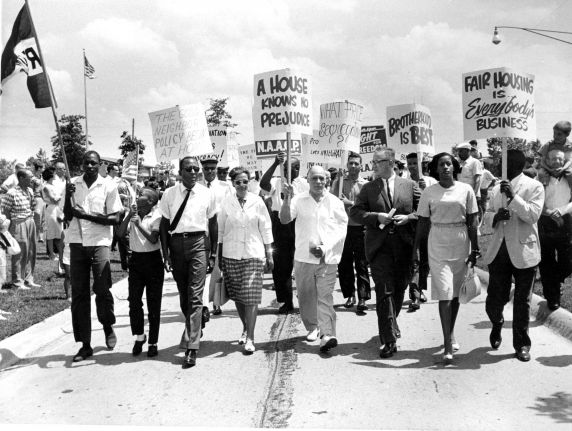Records of Jewish Community Council Reveal Mid-Century Concerns and Actions on Social and Racial Justice
A lesser-known, and maybe surprising, source for historians and researchers looking at 20th-century race relations in Detroit are the Jewish Community Council Records, part of the Jewish Community Archives at the Reuther Library.
This large collection documents grassroots discussions and actions in Detroit’s Jewish community and the wider urban community particularly from the 1940s to the 1970s.
Read more
A researcher can piece together some important social history after the focal points of the 1943 and 1967 race disturbances in the city. Issues about neighborhoods, businesses, schools, employment and the media are woven throughout, as communities tried to face and deal with racial and religious discrimination, prejudice and hate. While the Jewish Community Council was predominantly concerned with issues concerning the Jewish community, such as systemic anti-Semitism in schools, businesses and government, it also dealt with civil rights issues of concern to the wider community. Its records contain perspectives on white extremism, Jim Crow, systemic racism, educational disparities and discriminatory policing.
Efforts to bring communities together, especially the Jewish and African-American communities of the era, can be found in many documents in the Council records. There are meeting minutes, memos, reports and surveys, and press clippings from media outlets including what was then labeled “The Negro Press.” The Jewish Community Council was active in many civic organizations that came and went over these decades, among them the Metropolitan Coalition for Peaceful Integration, the Detroit Interracial Committee, the Detroit Committee on Community Relations, and the Coordinating Council on Human Relations. The minutes and reports of these organizations offer a lot of information about their goals.
The Jewish Community Council Records reveal idealism as well as pragmatism, defensiveness as well as progressive ideas, when it came to public education and the issues surrounding race and prejudice. Minutes and reports of the Detroit Public Schools board and various committees, which included representatives of the Jewish community, are included in the collection. There were attempts at many levels to educate teachers, staff and students through meetings, curriculum changes and workshops regarding “Democratic Human Relations.” Discrimination in sports and recreation, the ratio of white to Black faculty and staff in the schools, and teacher attitudes are topics that appear in a variety of documents. A 1949 document, “Report of the Subcommittee to Study the Practices of the Public Schools with Respect to Intercultural Education in Race Relations,” tells of the state of the district at that time, while later reports tell of changes as time elapsed.
In the decades of the 1940s to 1970s, the Jewish Community Council also dealt with the makeup and evolution of the predominantly Jewish neighborhoods of Detroit, mostly in the north and northwest areas of the city. Documents discuss tensions in the community, redlining and other real estate practices, neighborhood groups to promote harmony and others to “defend” neighborhoods, “Clean Up” campaigns, housing studies and resident surveys, legal actions and crisis management. The Council’s attempts, along with partner organizations, to address the issues—with neighborhood programs and activities, public meetings, committees and newsletters--are well documented here. One notable resource is a 49-page report released in October 1958, titled “Negro-Jewish Relations,” from the American Jewish Committee (AJC). It cites “Jewish ignorance” and “Negro misinformation” as a source of many tensions and a hindrance to understanding. It reviews hostility on both sides, discrimination, nationalism, expectations and institutional problems.
The efforts to accept and contribute to peaceful neighborhood evolution are contrasted with protests against “Negro occupancy” from the general community, but also from the KKK and other extreme groups. The Council records include local and national “anti-Negro literature” from the 1950s and anti-communist documents from the same period.
The Jewish Community Council followed news and opinions of the African-American community in Detroit, with many folders of clippings regarding organizations such as the National Council of Negro Women, the NAACP, the Negro Labor Committee and the Detroit Negro Labor Council.
Members of the Council lobbied at all levels of government to legislate civil rights, housing equity and labor rights, including the Fair Employment Practice Act. One noteworthy document is “Portrait of Michigan—A Story in Contrasts,” by Olive R. Beasley, Executive Secretary of the Michigan Committee on Civil Rights. Undated, though probably from the early 1950s, this essay traces some social and economic history of Michigan as far back as the 1830s, citing the state’s “rich liberal tradition” and its dealings with refugees from slavery in the South. Beasley bemoans the “retrogression” of the state regarding racial and social issues and particularly its legislative treatment of current Black citizens in terms of red-lining, job discrimination and civil rights.
The perspectives reflected in these records of a prominent community organization give a picture of neighborhoods and institutions in flux over several decades. Historians will find resources here to track the evolution of those concerns, problems and issues, and to ponder how much or how little has changed since then.
Some related collections at the Reuther Library:
Detroit Public Schools Community Relations Division Records
Detroit Board of Education Detroit Public Schools Records
NAACP Detroit Branch Records
Detroit Commission on Community Relations (DCCR) / Human Rights Department Records
Civil Rights Congress of Michigan Records
Tales from the Reuther Library podcast:
The Detroit Interracial Committee and Racial Pragmatism, 1944-1950


 Reddit
Reddit Facebook
Facebook LinkedIn
LinkedIn